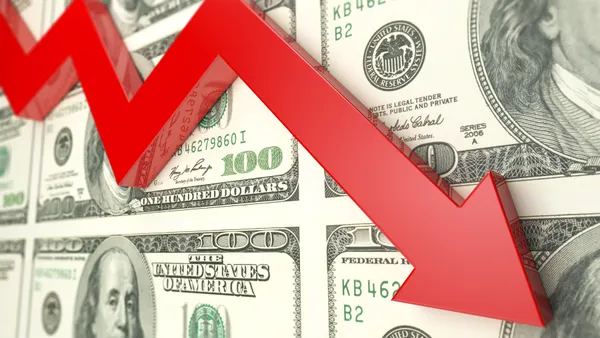Dive Brief:
- The outlook of CEOs soured this quarter on concerns that the economy will slow in the face of stubborn inflation, the Conference Board and Business Council found in a survey.
- During the next 12 to 18 months, 64% of CEOs anticipate a mild economic slowdown and a slight increase in price pressures, according to survey results. Thirty-eight percent of CEOs predict economic conditions will worsen in the next six months compared with 30% during the third quarter.
- “CEOs’ expectations for the economy turned from neutral to pessimistic,” Stephanie Guichard, senior economist for global indicators at the Conference Board, said in a statement. “Geopolitical instability and cyber risks continued to dominate top business risks impacting CEOs’ industries,” she said.
Dive Insight:
Economic forecasting has proven especially challenging in recent years, with solid gross domestic product growth blowing away widespread predictions of a recession.
Current estimates for future growth vary widely.
For example, the Federal Reserve Bank of Atlanta on Friday upgraded its estimate for third quarter growth to 3.9% from 3.8% early this month, while the Conference Board on Thursday estimated Q3 growth of 1.9%.
The government shutdown, now approaching a third week, has complicated forecasting. The federal government was unable this month to release data on September unemployment and retail sales, which would have offered insights on the health of spending by consumers, who fuel roughly 70% of economic growth.
Data releases were also delayed on September consumer and producer prices, which are “important in judging the impact of higher import tariffs and progress toward” reducing inflation to the Fed’s 2% target, Fed Governor Christopher Waller said Thursday in a speech.
Clarifying the outlook is also difficult as the job market shows signs of weakening amid steady economic growth, Waller said.
“Something's gotta give — either economic growth softens to match a soft labor market, or the labor market rebounds to match stronger economic growth,” Waller said.
“Since we don't know which way the data will break on this conflict, we need to move with care when adjusting the policy rate to ensure we don't make a mistake that will be costly to correct,” he said.
Policymakers last month flagged the softening labor market and trimmed borrowing costs for the first time this year, setting the federal funds rate at a range from 4% to 4.25%.
Waller said he supports further easing of the main interest rate, which is “moderately restricting aggregate demand and economic activity.”
CEOs this quarter see less risk than during Q3 that tariffs will harm their industries, the Conference Board and Business Council said. They see a bigger threat to their businesses from geopolitical instability, cyber attacks, new technology such as artificial intelligence, and legal and regulatory risk.
CEOs marked up plans this quarter for hiring and capital investment compared with Q3, the survey showed.
The share of CEOs planning to expand payrolls rose to 32% from 27% in Q3, while the proportion who intend to boost capital spending surged to 22% from 15%, the Conference Board and Business Council said.















